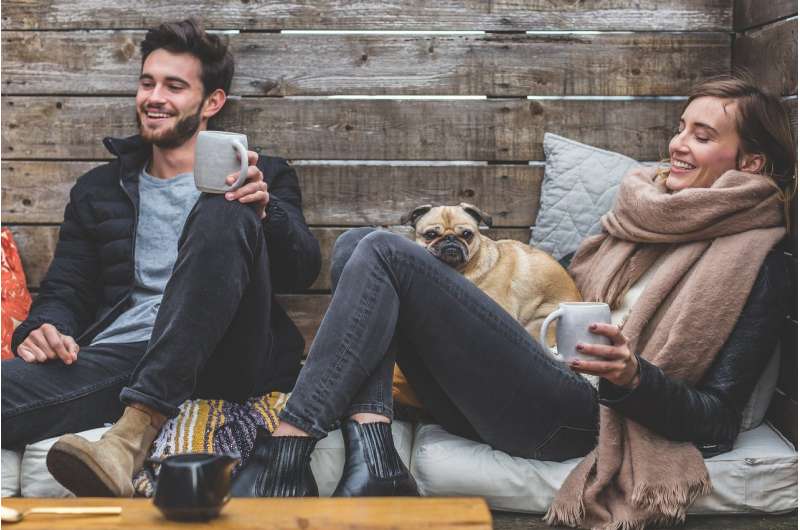This article has been reviewed according to Science X's editorial process and policies. Editors have highlighted the following attributes while ensuring the content's credibility:
fact-checked
trusted source
proofread
'Listen to us': Young people still too rarely consulted about relationships, sex and sexuality education

Academics at Cardiff University and UCL have sought to gain a greater understanding of young people's experiences of learning about relationships, sex, and sexuality.
The research, commissioned by and carried out in collaboration with the NSPCC, used creative and participatory methods, allowing researchers to listen carefully to the views and experiences of young people aged 11—18 years from across England, Wales and Scotland, about how and where they learn about relationships, sex and sexuality, what they would like to learn more about, and how they seek support and advice.
A central part of the project included working with a young person's advisory group (YPAG) who helped shape the research methods, contribute to the process of analysis and co-construct the creative outputs, including making eight data-poems created from young people's quotes for each key messages of the report.
The team found that young people referenced a range of spaces where they learn about the topic, including with friends, family, social media, popular culture and school.
Although some young people describe their learning about relationships, sex and sexuality education (RSE) at school as limited, awkward, ineffective and irrelevant to their everyday lives, many said that they still want to learn about relationships, sex and sexuality in school. They want to be able to discuss and ask questions about what they are learning in safe and supportive learning environments and want those who provide RSE to be supported and resourced to make this happen.
One participant, Hattie (pseudonym), said, "The way they taught us about contraception, because it was part of the curriculum, it seemed very scientific and very impersonal, kind of far away because we were learning about it, not for us (…) you should be talking to us (now), not about our future selves." (age 17)
Ryan, (pseudonym), said, "I like my tutor, but he's a math teacher, so he's not really a specialist in everything. He's nice, but I want him to know what he's on about and feel comfortable about what he's saying."
Researcher: "And do you have a sense of how that might happen?"
Ryan: "Just training on that." (age 14)
When asked about what changes they want to see, young people said they would like:
- Adults to educate themselves about young people's lives and experiences.
- Parents, trusted adults, educators, and peers to show care and compassion for their diverse experiences, be more open-minded, stand up for equity and challenge discrimination.
- Teachers to be provided with resources and support to help them feel more comfortable and confident in what and how they educate.
- The curriculum to be more comprehensive and more closely connected to their own lives and the real-world experiences of others.
- To be consulted on how they would like to learn and access support in these areas, such as what they think makes a safe, supportive and inclusive learning environment.
Project lead, Professor EJ Renold, based at Cardiff University's School of Social Sciences, said, "Listening to young people matters. This research used creative methods to facilitate inclusive and safe environments for listening to young people. By listening to young people, we are educating ourselves on what and how they are learning about relationships, sex and sexuality. In fact, how we listen to and consult with young people in this area became a key research finding for those working with young people. It also informed how we structured our research report and co-produced our creative outputs with the young people's advisory group."
"All our outputs prioritize and amplify youth voice, including the recommendations for change. We hope that they will guide those with decision-making powers so that any current and future policies, resources, and practices in this area are informed by what and how young people are already learning and want to learn."
Dr. Sara Bragg from UCL said, "Now is a crucial time to take seriously young people's rights to be consulted on how RSE is provided. Too often what is considered age-appropriate or timely is disconnected from young people's own perspectives and experiences. Our research is grounded in young people's everyday lives and shows how they navigate and negotiate learning about relationships, sex and sexuality across diverse contexts, institutional spaces, practices and situations. We hope our research findings will contribute to more meaningful and informed conversations with young people about what matters to them in learning about relationships, sex and sexuality."
Maria Neophytou, NSPCC Director of Strategy and Knowledge said, "High quality relationships and sex education is absolutely vital in ensuring young people understand healthy relationships, are able to recognize abusive behavior and know how to seek help. It reinforces that young people have a right to be safe, heard and respected."
"It's essential that young people are part of the conversation about how relationships and sex education is provided. Our research shows how much young people have to contribute to this conversation."
More information: Report: learning.nspcc.org.uk/research … nships-sex-sexuality
Provided by Cardiff University




















